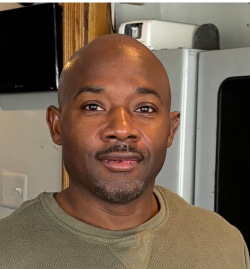

Dennis Boatwright, II
Political Activist

Will the rest of Africa, Diaspora maximize opportunities before geopolitical shift ends?
There are moments in history that are not only consequential—but defining. These moments do not occur frequently, nor do they occur gradually--they are rare and happen quickly. When these geopolitical shifts occur, people must adjust rapidly to fleeting opportunities that will not likely happen again in their lifetimes.
A Geopolitical shift is a significant change in the international global power, relationships between nations, and the way international affairs are conducted. They are precipitated by specific conditions: war and conflict, rise or decline of major powers, internal instability, or technological innovations. Any one of these ruptures can create a power vacuum that, with the right leadership, can be transformed into a golden opportunity. Europe’s mastery of the art of ship building in the 15th century, coupled with their preexisting understanding of weaponry, is an example of the West using technological innovations to rescue Europeans from nine-hundred dreadful years of the Dark Ages.
However, inflection points themselves do not create promise. A nation or people must be dedicated to doing the necessary work. That is, people wanting tangible improvements must seize the moment. And they must be willing to embrace new mindsets to maximize opportunities that suddenly fall upon them. This means being flexible, open-minded and receptive to new ideas. This also implies not only identifying opportunities but taking calculated risks to achieve them.

History is replete with keen statesmen who took advantage of geopolitical shifts. One such hero of African descent is Haitian revolutionary leader Jean Jacques Dessalines. Like his predecessors Henry Christophe and Toussaint L’overture, Gen. Dessalines was beguiled into surrendering to the French army after the capture of Toussant in 1802. When all seemed to be lost during the Haitian Revolutionary War, which lasted from 1791 to 1804, Dessalines saw that the French enslavers overstretched themselves in 1803 by starting what has come to be known as the Napoleonic Wars. By adding Britain, Russia, Prussia, and Austria to its continuously evolving list of adversaries, the French military found itself overstretched and diminished. Dessalines saw a weakened France as an opportunity to relaunch the liberation movement. His calculations proved correct: One year later, Haiti won its independence in 1804.
Ho Chi Minh is another leader who saw that his country was amidst a global geopolitical realignment. France began colonizing Vietnam in 1858. By 1887 France dominated Indochina. But, in 1941 France was invaded and occupied by Germany during WWII. When Ho Chi Minh heard this breaking news, he did not celebrate. He immediately organized a serious liberation army. Under the leadership of General Vo Nguyen Giap the Vietminh resistance movement went on to wage one of the most spectacular guerrilla warfare campaigns in modern times. By 1954 France began to retreat from Vietnam after suffering a decisive lost at Dien Bien Phu.

Upon hearing France’s defeat in Vietnam, that same year Ahmad Ben Bella spearheaded a resistance movement in Algeria. Within five years it was obvious that France was losing its war in Algeria. Consequently, France’s troubles in Algeria inspired sixteen formerly colonized African nations to boldly declare their independence in 1960.
However, for sixty years people of African descent have been unable to take advantage of changes in the international order. But in 2021, Malian military Gen. Assimi Goita broke this lull. Goita captured state power, expelled foreign armies, then nationalized his country’s vast natural resources. Goita’s bold actions inspired Capt. Ibrahim Traore and Gen. Abdurahamane T’chiani to follow suit in Burkina Faso and Niger, respectively. After their courageous moves, all three newly independent nations confederated and formed the Alliance of Sahel States. Since establishing their borderless confederation, all three countries are experiencing rapid industrialization, and now boast of the fastest growing economies in the world.

As a result, the Alliance of the Sahel States is considered the blueprint for other African nations to follow. For example, recently Namibia, Zambia, and Botswana announced the formation of a borderless alliance. The agreement will allow citizens of the three countries to freely travel throughout the alliance. Uninhibited movement will promote greater trade and cooperation. The announcement, made by Namibian President Netumbo Nandi-Ndaitwah, sent shock waves throughout the West, prompting the U.S. State department to immediately dispatch an envoy to the region to discourage such cooperation.
Although the rapid developments occurring in the Alliance of the Sahel States and amongst Namibia, Zambia, and Botswana is encouraging, it is disheartening that far too little African nations and people of African descent are motivated to take advantage of this window of opportunity. When asked by this writer, why his country declared independence in 2021, a Malian official simply said: “We saw an opportunity.”
Perhaps the diplomat was referring to the fact that Europe is led by low grade leaders who are off balance trying to address the Russian-Ukraine war, Israeli militarism in the Middle East, and the rapid abandonment of the IMF and the World Bank to join the BRICS. These disruptions are hobbling the West and creating opportunities for people of African descent to remove impediments to their progress. How long this window of opportunity remains open is a question many are wondering. But an even bigger question is: Will we take advantage of it?
Posted: Tue, Aug 19, 2025









